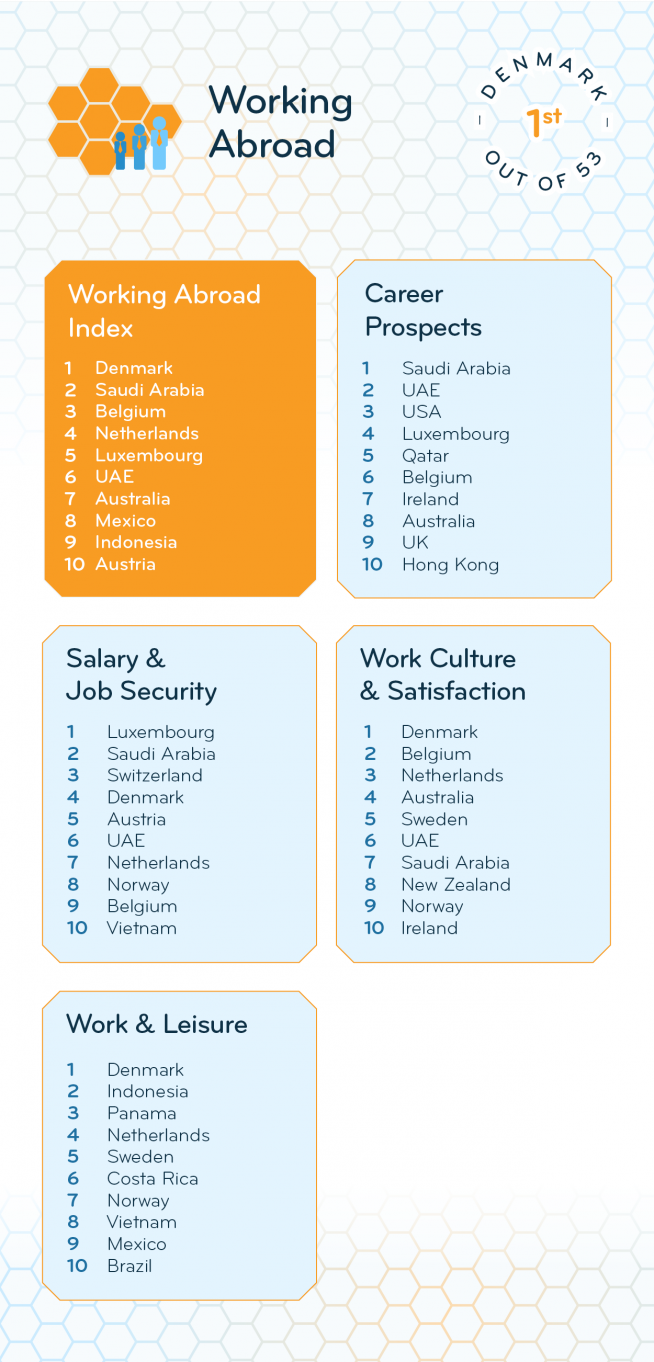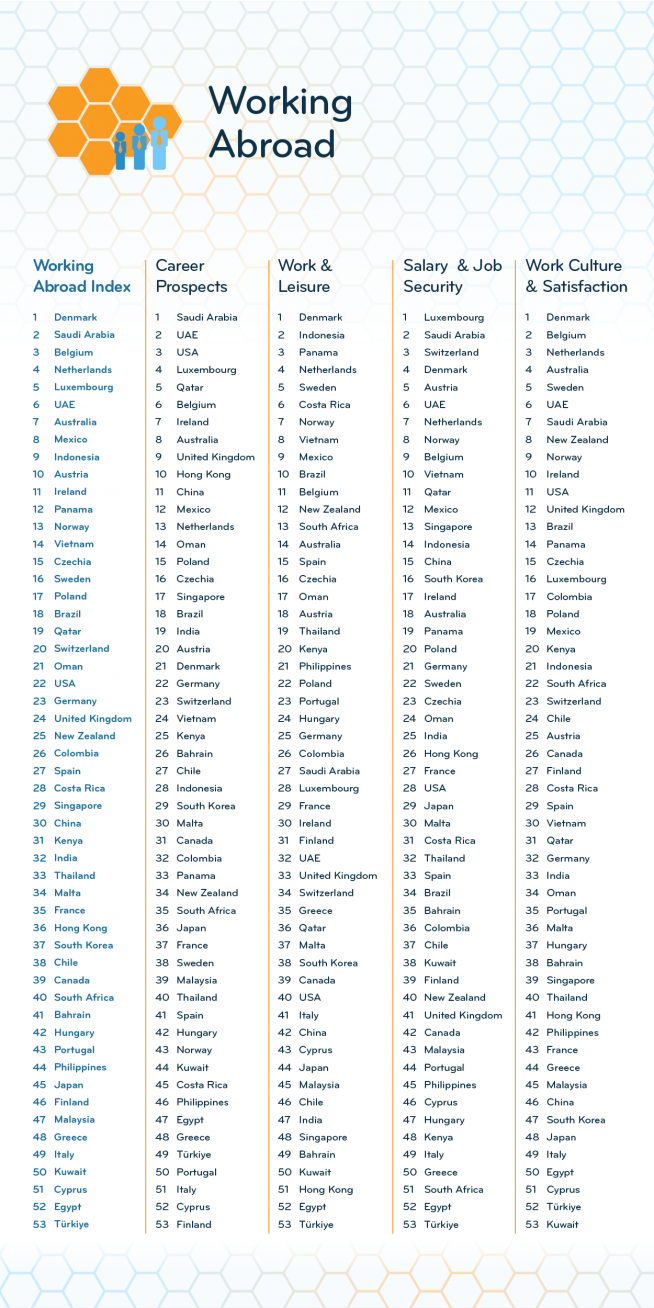Discover the Best (& Worst) Places for Your Career in 2024
- Methodology
- Great Working Hours in Denmark (1st)
- Saudi Arabia (2nd), THE Place for a Career?
- Enjoying Flexibility in Belgium (3rd)
- Economic Woes in Türkiye (53rd)
- Egypt (52nd) Offers Little Job Security
- No Fair Pay in Cyprus (51st)?
- Trends in the Top 10
- Trends in the Bottom 10
- The Biggest Winners in 2024
- The Biggest Losers in 2024
- Full Ranking
- Further Reading
The Top 10
Methodology
The Working Abroad Index is based on four subcategories with two to three rating factors each.
The Career Prospects Subcategory considers expats’ rating of the local job market; their personal career opportunities; and if moving to the country improved their career prospects.
In the Salary & Job Security Subcategory, a destination’s state of the economy, the local job security, as well as whether expats feel paid fairly for their work are taken into account.
Work & Leisure measures expats’ happiness with their working hours and work–life balance.
General job satisfaction and the local business culture’s support of flexibility (e.g., remote work, flexible hours) combine to form the Work Culture & Satisfaction Subcategory.
For a country or territory to be included in the index, at least 50 respondents were required. In 2024, a total of 53 destinations met this minimum sample size.
Great Working Hours in Denmark (1st)
Following an already impressive 6th place in 2023, Denmark has made it to the top of the Working Abroad Index in 2024. The country ranks 1st for two subcategories: Work Culture & Satisfaction and Work & Leisure.
“Work–life balance is great, and 5 to 6 weeks of holidays are the standard.” – Australian expat
Over four in five respondents (84%) are satisfied with their work–life balance (vs. 60% globally). A similar share (83%) praise their working hours, 21 percentage points more than the share of expats worldwide (62%). With a weekly average of 39.2 hours, expats working full time in Denmark spend fewer hours at their jobs than the global average of 42.5 hours.
Close to two-thirds of expats in Denmark (65%) say they can work remotely some of the time (vs. 48% globally). And 82% agree that the Danish business culture supports flexibility (vs. 56% globally), ranking the country 1st for this aspect. It seems hardly surprising that close to three-quarters (72%) are generally satisfied with their job (vs. 60% globally).
Not everything is perfect, though. While the country ranks 5th for the state of its economy, expats are less satisfied with their job security (22nd), and an average 60% agree that they are paid fairly for their work (vs. 58% globally). With a 21st place out of 53 countries, Denmark’s result in the Career Prospect Subcategory is modest.
Saudi Arabia (2nd), THE Place for a Career?
On the other hand, second-placed Saudi Arabia in the Working Abroad Index is the top destination worldwide regarding expat careers. More than half of respondents in the country (55%) rate the local job market positively (vs. 41% globally), and over three in ten (31%) give it the best possible rating (vs. 12% globally).
Similarly, expats in Saudi Arabia are much more likely to agree that the move there has improved their career prospects (75% vs. 56% globally) and rate their personal career opportunities favorably (62% vs. 53% globally).
“I like how there are work opportunities for highly skilled professionals.” – Spanish expat
This is great news for the 63% who moved to Saudi Arabia for job-related reasons (vs. 35% globally). Once in the country, they’re very much satisfied with the state of the local economy (82% vs. 59% globally), ranking Saudi Arabia 2nd in the Salary & Job Security Subcategory.
The drawbacks of working in Saudi Arabia? Expats face rather long workdays with an average of 47.8 hours a week for full-time positions (vs. 42.5 h globally). This is also reflected in the ranking: the kingdom receives its worst results in the index when it comes to expats’ working hours (23rd) and work–life balance (27th).
Enjoying Flexibility in Belgium (3rd)
Belgium is among the biggest winners in the 2024 Working Abroad Index. While it ranked 21st out of 53 destinations in 2023, the country places 3rd only a year later.
Expats praise their job security (2nd), the local job market (7th), and their personal career opportunities (9th). In fact, close to two-thirds (65%) agree that moving to Belgium has improved their career prospects (vs. 56% globally).
“What I like about Belgium? The infrastructure and services, the quality of education, and the work opportunities.” – Zimbabwean expat
Another big plus is the local business culture which supports flexibility, at least according to over three-quarters of respondents (76%), 20 percentage points more than the global average of 56%. This flexibility is reflected in the high share of expats who say they can work remotely some of the time (68% vs. 48% globally).
Coupled with a shorter work week — on average, expats in a full-time position spend 40.8 hours at their job (vs. 42.5 h globally) — it’s hardly surprising that people are happy with their working hours (11th) and work–life balance (11th) in Belgium.
Economic Woes in Türkiye (53rd)
Türkiye — already ranking second to last overall — places last in the Working Abroad Index for the third time in a row. According to expats, it’s the worst country when it comes to Work & Leisure (53rd) as well as Salary & Job Security (53rd). Close to two in five (38%) are dissatisfied with their working hours in Türkiye (vs. 17% globally).
Nearly two-thirds (64%) rate the state of the Turkish economy negatively (vs. 19% globally). Despite a higher-than-expected economy growth in 2023, the country continues to struggle with high inflation and interest rates, low investment in technology, and a continued brain drain of skilled workers.1
“The job insecurity, general inflation, and economic instability bother me.” – German expat
Job security — or rather a lack thereof — is something that other expats point out, too: a third (33%) rate it negatively, compared to 22% worldwide. A similar share (34%) disagree that moving to Türkiye translated into improved career chances (vs. 21% globally). Overall, 40% rate their career opportunities negatively, 15 percentage points more than the global average of 25%.
Luckily, only a quarter (25%) say work was the main reason for relocating to the country. Worldwide, this is the case for more than a third of expats (35%). Among those who are working, more than twice the worldwide average (22% vs. 10%) have jobs in education (including language education).
Egypt (52nd) Offers Little Job Security
As in Türkiye, expats in Egypt are dissatisfied with most aspects of the Working Abroad Index, ranking the country second to last (52nd) in 2024. It's the worst place to be for job security, work–life balance, and overall job satisfaction (53rd each).
Over two in five expats (43%) find themselves dissatisfied with their job in Egypt, more than double the global average of 19%. And 37% have nothing good to say about both their work–life balance (vs. 19% globally) and job security (vs. 22% globally).
Battered by a prevailing foreign currency crisis, global shocks, and a historically high inflation, Egypt’s economy is only slowly expected to recover.2 Expats feel this, too: just 15% regard the local economy positively (vs. 59% globally). Consequently, they do not have high hopes for the local job market (46th) or their personal career opportunities (50th), either.
No Fair Pay in Cyprus (51st)?
In 47th place in 2023, Cyprus was already among the worst-performing countries for working abroad. It has since fallen further to rank 51st out of 53 in the 2024 index.
Two in five expats in Cyprus (40%) rate their personal career opportunities negatively, 15 percentage points more than the global average of 25%. An even higher share (41%) disagree that their move has improved their prospects (vs. 21% globally) — Cyprus ranks second to last in the Career Prospects Subcategory (52nd).
“Working opportunities for foreigners are rare (especially for students).” – Lebanese expat
A good thing then that only 16% of respondents moved to Cyprus for work-related reasons (vs. 35% globally). In fact, just 46% of expats there are currently working (vs. 69% globally), while 41% are already retired (vs. 11% globally).
Still, for those with work, things are not looking bright. Only around two in five are satisfied with their job (39% vs. 60% globally) and working hours (41% vs. 62% globally). Another 41% find they’re not paid fairly for their work (vs. 22% globally) — only Kuwait ranks worse for this factor!
Trends in the Top 10
- Denmark
- Saudi Arabia
- Belgium
- Netherlands
- Luxembourg
- UAE
- Australia
- Mexico
- Indonesia
- Austria
In 2024, the top 10 of the Working Abroad Index saw quite the shake-up: five countries were dethroned, with those replacing them rising in the ranks by 12 to 18 places.
Five countries can be found in Europe: the Netherlands (4th), Luxembourg (5th), and Austria (10th) join Denmark (1st) and Belgium (3rd) at the top. Expats in these countries particularly appreciate the economy and job security in their new homes. Only Denmark receives a rather average result for the latter (57% vs. 56% globally), while expats in Luxembourg couldn’t be happier (76%) and rate the country 1st for job security.
The European destinations receive good to very good results regarding working hours, from Austria’s 16th to Denmark’s 1st place. Luxembourg (27th) loses here, though full-time working expats also report longer weekly hours there (42.9 h vs. 42.5 h globally), compared to the 40-odd hours in the other four destinations.
The UAE (6th) joins Saudi Arabia (2nd) to represent the Middle East in the top 10. That’s good news for the around three in five respondents who moved there for work-related reasons (63% Saudi Arabia; 58% UAE; vs. 35% globally). Both destinations rank very well for Career Prospects (2nd UAE, 1st Saudi Arabia) and Work Culture & Satisfaction (6th, 7th).
The Salary & Job Security Subcategory paints a similar picture (6th, 2nd), though expats in the UAE are less likely to agree they’re paid fairly (55% vs. 61% in Saudi Arabia and 58% globally). Opinions on Work & Leisure are also similar, if more negative overall: just 55% of respondents in each country rate their work–life balance favorably (vs. 60% globally).
Australia (7th), Mexico (8th), and Indonesia (9th) are, geographically, the odd ones out in the top 10. Expats in Australia highlight the local job market (2nd) and a business culture that favors flexibility (4th), while Mexico delights with a great work–life balance (4th) and personal career opportunities (5th). And expats in Indonesia are the most satisfied worldwide with their job (1st).
Trends in the Bottom 10
- Philippines
- Japan
- Finland
- Malaysia
- Greece
- Italy
- Kuwait
- Cyprus
- Egypt
- Türkiye
The bottom 10 of the Personal Finance Index shows few surprises — with the exception of Finland (46th), which saw a major drop in 2024 (down from 5th in 2023!).
Five of the ten worst-ranked countries are Mediterranean destinations: joining Türkiye (53rd), Egypt (52nd), and Cyprus (51st) are Italy (49th) and Greece (48th). Both were regularly found towards the bottom of the index in previous years. Expats there continue to be dissatisfied with most aspects of the index, including the state of the countries’ economies (47th Italy; 49th Greece) and job markets (50th; 47th). Luckily, work isn't the main relocation motivation for any of these destinations. In Greece, for example, only 18% say they moved for a job (vs. 35% globally).
Three Asian destinations are also found in the bottom 10: Malaysia (47th), Japan (45th), and the Philippines (44th). The specifics differ, however. While expats in the Philippines are dissatisfied with the local job market (48th) and job security (46th), they’re mostly happy with their jobs (13th) and work–life balance (21st). The latter is an issue in Japan: less than half (46%) rate their work–life balance favorably, compared to 60% of expats worldwide.
Kuwait (50th) rounds out the bottom 10. The destination has never done well in this index in past editions of the Expat Insider survey — even though work is the main reason expats move there (68% in 2024 vs. 35% globally). It is the worst-performing country worldwide regarding Work Culture & Satisfaction (53rd), and twice the global average of respondents rate their work–life balance negatively (38% vs. 19% globally).
The Biggest Winners in 2024
With a jump in 19 ranks — from 37th to 18th place — Brazil is the undisputed winner of the 2024 Working Abroad Index. The country sees improvements across most factors, even if expats are still not satisfied with the state of the Brazilian economy (45% positive ratings vs. 59% globally). Nevertheless, they have a more positive view of the local job market (from 28th to 6th) and their personal career opportunities (27th to 16th). And while around three in five respondents in 2023 (58% vs. 62% globally) said they were paid fairly for their work, this share has risen to over three-quarters in 2024 (76% vs. 58% globally).
After ranking in the lower middle tier in 2023 (30th), Panama nearly made the top 10 in 2024 (12th). Expats are enjoying their work–life balance (11th to 3rd) and working hours (16th to 7th) more than ever, with improved job security (from 45th to 24th) and career opportunities (16th to 3rd). In fact, close to two-thirds (65% vs. 53% globally) rate the latter favorably in 2024, compared to just 55% of respondents in 2023 (vs. 57% globally).
Expats in Indonesia — which jumped from 27th place in 2023 to rank 9th in 2024 — couldn’t be happier with their jobs (1st) and work–life balance (1st). Close to four in five respondents (79% vs. 60% globally) praise the latter, compared to an average share of 66% in 2023 (vs. 63% globally). Their opinion of the state of the economy has improved noticeably, too (32nd to 16th). However, not everything’s better: while an average 47% of expats regarded the local job market favorably in 2023 (vs. 47% globally), this share dropped to 39% in 2024 (vs. 41% globally).
Like Panama and Indonesia, Belgium (21st in 2023) rose by 18 ranks — to place 3rd in 2024.
The Biggest Losers in 2024
Finland’s 5th place in the 2023 Working Abroad Index was an outlier, compared to it regularly ranking in the 20s in previous years. The drop down to 46th place in 2024 is extreme, however. The country lost ground across all factors of the index, even the Work & Leisure Subcategory (31st) where it was usually found in the top 10 and even ranked 1st in 2023.
Expats now place Finland last for both the local job market (29th in 2023) and their personal career opportunities (35th in 2023). A year ago, close to half of respondents (48%) agreed that moving to Finland improved their career prospects (vs. 59% globally). In 2024, only three in ten (30%) say the same (vs. 56% globally).
Canada experienced a drastic drop for similar reasons. After ranking 7th in 2023, the country freefalls to 39th just one year later. Expats have become less satisfied with the state of the Canadian economy (69% positive ratings in 2023 vs. 50% in 2024), the local job market (59% vs. 38%), and their job security (64% vs. 48%). And working hours, which used to be a highlight of working in Canada (6th in 2023), are now viewed more negatively (37th).
Full Ranking
Further Reading
- The Best & Worst Countries for Living Abroad in 2024
- Indonesia Offers a Warm Welcome & Great Finances
- Of Visa & Working Woes in Italy
- Kuwait Turns Up the Heat in More Ways than One
- Mexico Continues to Delight Expats in 2024
- Türkiye Places Last for Working Abroad
- Expats in the UAE Shell Out for Their Convenient Lifestyle
- Expat Insider 2023 | Passport to Success: The Top (& Bottom) Places for Working Abroad




